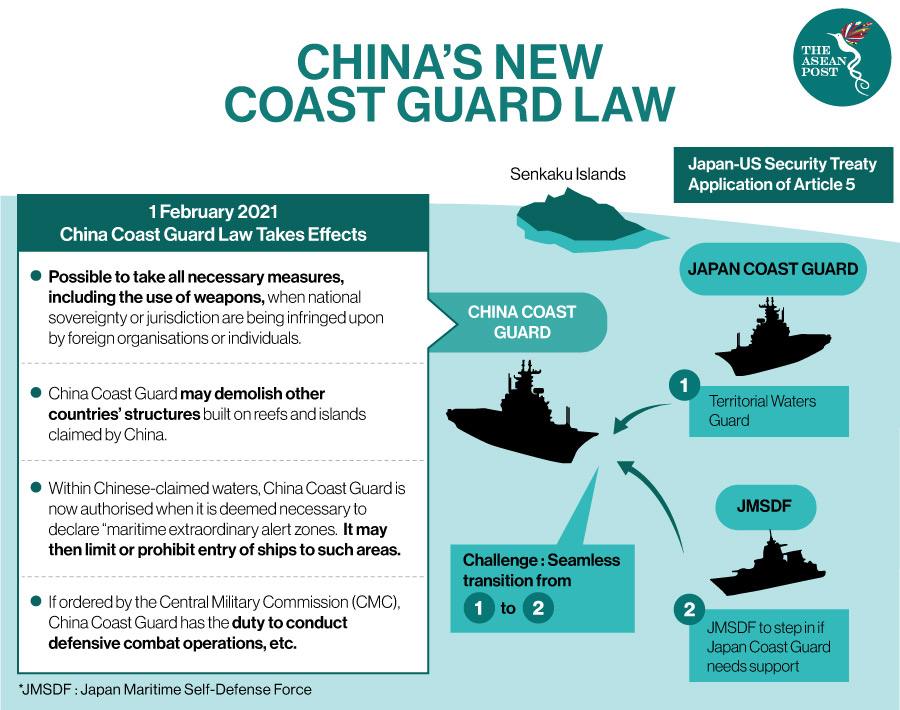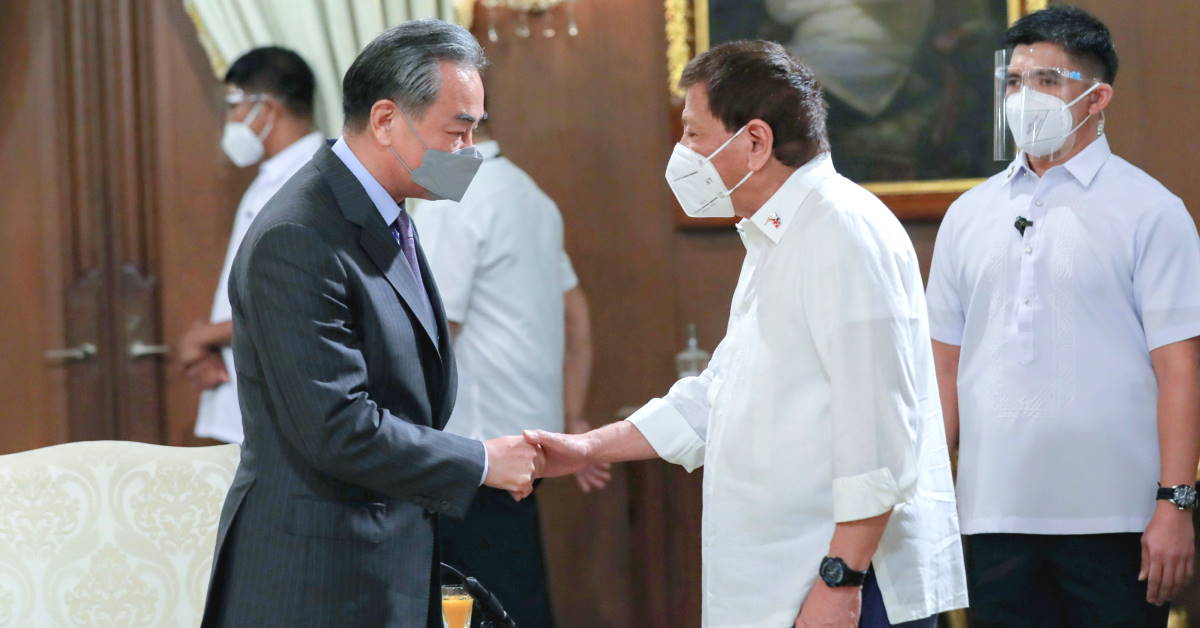Several issues involving China and the Philippines had once again threatened the flourishing and warm bilateral relations between the two countries and these include: (a) the alleged harassment of a Filipino Fisherman by the Chinese Coast Guard; (b) the alleged intrusion of a Chinese survey ship which was reported as intruding Philippine maritime territory; (c) the seizure of a dredger off Bataan by the Philippine Coast Guard and the Bureau of Customs for illegal and unauthorised presence about 13 kilometres Southeast off Orion Point in Bataan province of which China was accused of; and (d) the misplaced apprehension on the newly approved China Coast Guard Law (CCGL) by the People’s Congress Standing Committee, China’s highest legislative body by certain political personalities like Senator Risa Hontiveros from the political opposition.
Furthermore, these issues are being exploited and hyped-up by some media outlets and political personalities, seeking to discredit Philippine-China relations to push their agenda and political interests to the fore.
These irresponsible parties are not concerned by how this will impact the bilateral relations between China and the Philippines which the Duterte administration has been cultivating for the mutual benefit of both countries. On this note, it is imperative to shed light on all these issues and somehow add clarity and perspective to each of them.
Non-Existent Harassment Of A Fisherman
It can be recalled that the Philippine Daily Inquirer reported on 26 January, 2021 that a certain Larry Hugo reported through social media that he was harassed as he was headed to a fishing group near Pag-Asa on 25 January, 2021. Hugo narrated that a Chinese ship blocked his way, forcing him to turn around for fear of being attacked with a water cannon which could cause his boat to sink.
Nevertheless, such baseless reports were disputed by Navy Rear Admiral Ramil Enriquez, commander of the Western Command who made some clarifications vis-à-vis Hugo’s claims and contended that such an incident never happened.
Enriquez in a media interview said that “when we enlarged a photo from the video which he posted on his Facebook account, we noticed that there was no movement of the water which we normally see when a ship is moving. This means that the Chinese ship was not moving during that time.”
Enriquez further contended that the navy immediately conducted an investigation and based on the findings of the investigation, there have been no reports whatsoever of harassment on Filipino fishermen by Chinese vessels for more than a year now.
Fake News On The Dredger And Survey Ship
On the other hand, the accusations that a dredger spotted for illegal and unauthorised presence about 13 kilometres Southeast off Orion Point in Bataan province was a Chinese vessel was again another blunder on the part of those who propagated such fake news.
The Chinese Embassy in Manila clarified the matter by saying that the dredger, MV Zhonhai 68 is neither a Chinese vessel nor registered in China.
It contended that based on “initial investigations” on the identity of MV Zhonhai 68 by relevant Chinese authorities, the ship is not registered in China and is not a Chinese ship. Accordingly, there was no Chinese national on the dredging ship when it was found. The Chinese Embassy in Manila cited the information provided by the International Maritime Organization, which confirms that the dredger with an IMO number of 8692665, is under the flag of Sierra Leone.
Furthermore, the sensationalised reports and speculations on the entry of a Chinese scientific survey ship into Philippine waters as an “intrusion,” operating without consent and had no clearance from the Philippine government was another fake news.
According to the Chinese embassy in Manila, the fact of the matter is that the Chinese scientific survey ship was seeking humanitarian shelter in Philippine waters due to unfavourable weather and sea conditions in the Pacific where they are scheduled to conduct a research mission. The ship had sought clearance and humanitarian assistance from the Philippine government and maintained communications with relevant authorities all the time.
Under the United Nations (UN) Convention on the Law of the Sea (UNCLOS), International Convention for the Safety of Life at Sea (SOLAS), and international customary law, every coastal state is obliged to provide necessary humanitarian assistance to save lives at sea. It is a fact that China and the Philippines have been assisting each other on many similar humanitarian occasions.
Misplaced Apprehensions On The CCGL
China’s newly enacted coastguard law that took effect on 1 February, 2021, which explicitly authorises pre-emptive strikes against foreign vessels in waters “under China’s jurisdiction,” had caused alarm in the Philippines and other neighbouring countries.
While concerns and uneasiness about the newly approved China Coast Guard Law (CCGL) are valid, to label it as “a verbal threat of war to any country that defies it” or a “virtual declaration of war” on the part of China by certain political personalities and groups in the Philippines is far-fetched and speculative without tangible basis whatsoever.
Nevertheless, as far as the Chinese Embassy in Manila is concerned the, “China Coast Guard is an administrative law enforcement agency. The formulation of the Coast Guard Law is a normal domestic legislative activity of China. The content of the law conforms to international conventions and the practices of the international community.”
The Chinese Embassy in Manila further contended that the China Coast Guard Law (CCGL) doesn't specifically target any country. The enactment of the law doesn’t indicate any change in China’s maritime policy. China has always been committed to managing differences with countries including the Philippines through dialogue and consultations and upholding peace and stability in the South China Sea.
The Chinese embassy in Manila further reiterated that enacting such a coast guard law is not unique to China, but is a sovereign right of every country.
Likewise, Tian Shichen, vice president of Grandview Institution, a think tank group also expressed that every country has the right to carry out law enforcement in waters and airspace under its jurisdiction, including the use of force, as long as the exercise of this power is within the scope of the authorisation of international law, and does not violate the international obligations assumed by the country.
Furthermore, according to Shuxian Luo, a Ph.D. Candidate in International Relations at the School of Advanced International Studies (SAIS), Johns Hopkins University, authorising maritime law enforcement personnel to use force on foreign vessels is a common practice adopted by coast guards in the region, and China’s coast guard law does not represent a deviation or outlier in this regard.

For example, Japan revised its Coast Guard Law in 2001, authorising its coast guard personnel to use weapons against foreign vessels within Japanese waters in situations deemed as reasonable and necessary. South Korea authorised its coast guard officers in 2016 to use firearms including handguns and onboard cannons against Chinese fishing vessels operating illegally in Korean waters should the situation be deemed threatening.
Likewise, Vietnam’s coast guard law passed in 2018 grants its maritime law enforcement personnel greater latitude to open fire at sea.
Even the Philippines for that matter had enacted similar legislation – the Philippine Coast Guard Law of 2009 that established the Philippine Coast Guard (PCG) as an armed and uniformed service but thus far has not been seen as a “threat of war.”
Hence, the misplaced apprehensions of some segments of Philippine society more particularly those belonging to the political opposition are without a doubt a product of double standards and prejudice against China, when other countries like Japan, Vietnam, and even the Philippines have similar laws.
Conclusion
In retrospect, the recent issues surrounding China and the Philippines were indeed blown out of proportion by some political forces and media outlets in the country. The reports were not necessarily based on facts and tangible information but rather on speculations coupled with baseless accusations, which caused unnecessary commotion and affected the bilateral relations between China and the Philippines.
Fortunately, a pragmatic and street-smart leader like Duterte who knows his geopolitics well enough did not entertain the tirades of the political opposition against China over these issues thereby diffusing unnecessary tensions with China.
Moreover, the Philippines as it pursues its bilateral relations with China must maintain a pragmatic approach based on geopolitical realities, mutual respect, and cooperation rather than speculations, fake news, and baseless accusations coming from the political opposition.
As a country, it would be wise for the Philippines to choose its battles wisely. Meaning, it should gear its attention more on establishing closer economic and diplomatic ties with China, while protecting and upholding its national interests, which is a win-win situation for both.
It should also continuously pursue its “independent foreign policy” of being friends to all and enemies to none. Antagonism and unnecessary conflict with China would not in any way benefit the Philippines.
On the other hand, in a much broader context, if one will dig deeper and will examine more the context behind the enactment of the China Coast Guard Law, one will somehow understand that it is China’s way of clarifying and standardizing the operations of its coast guard, which more or less had suffered institutional fragmentation and a lack of solid legal foundation.
The primordial intention of the law is to set guidelines for Chinese coastguard personnel on “how to escalate the level of force employed”. In this regard, the said law should be treated as a welcome and positive development as it offers more rationalised and organised guidelines on how Chinese coast guard personnel can operate and carry-out their functions.
However, China must also understand and be more cognizant of the apprehensions, concerns, and the certain level of mistrust in the enactment of its new coast guard law. As a responsible member of the international community, it has to take some concrete steps of reassuring its neighbours of its peaceful and cooperative intentions through engagements, diplomacy, and transparency in all its actions in the South China Sea.
Related Articles:

